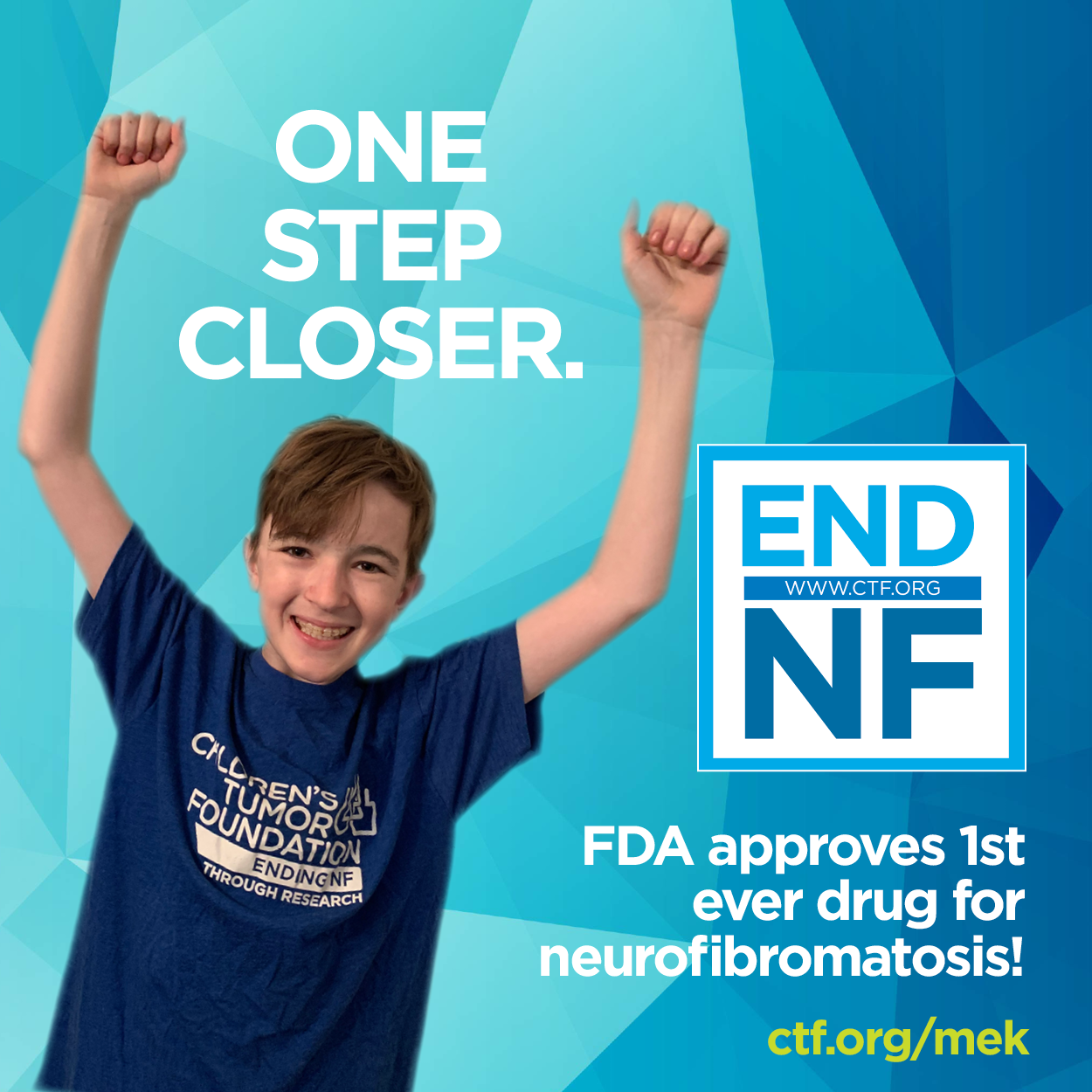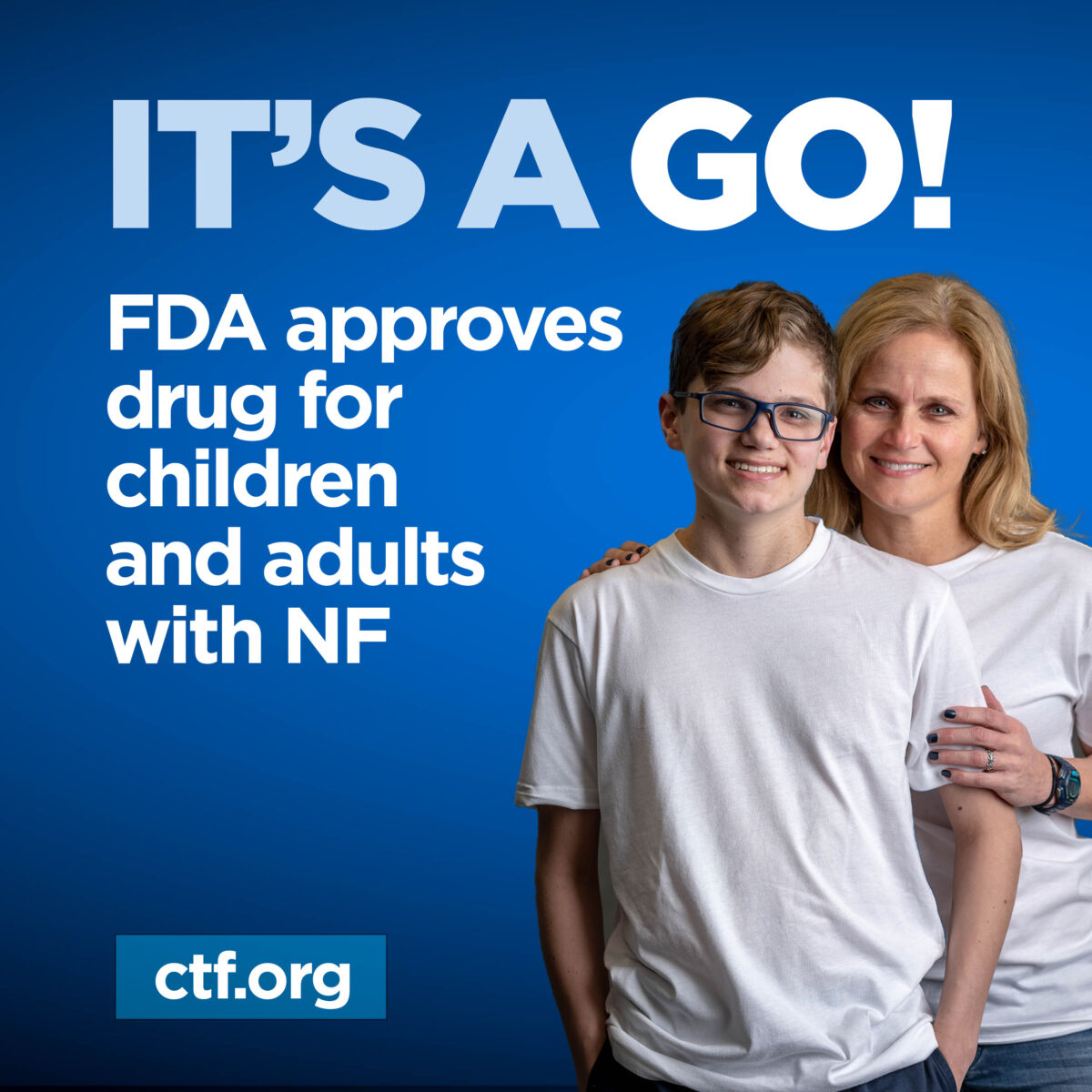Neurofibromatosis type 1 (NF1) is a complex genetic condition, but thanks to groundbreaking research and the tireless efforts of the global NF community, we are making incredible strides in understanding and treating NF1. This page highlights milestones in NF1 research and treatment, showcasing the collective progress transforming the lives of those living with NF1 today and inspiring a brighter future for tomorrow.
CTF Progress in NF1
Approved Treatments
Koselugo (Selumetinib)
In the spring of 2020, the U.S. Food and Drug Administration (FDA) announced the approval of Koselugo (selumetinib) for use in patients with inoperable plexiform neurofibromas, a common manifestation in neurofibromatosis type one (NF1).
Koselugo is the first and only approved treatment for NF and has paved the way for the development of more treatment options for all types of NF.
The FDA’s approval of AstraZeneca’s and MSD (Merck)’s submission was a major milestone for patients living with NF. We are at this game-changing moment because of the support of CTF donors, who funded the pioneering research that led to FDA approval.

The Road to The First Approved Drug for NF
GOMEKLI™ (Mirdametinib)
In 2025, the U.S. Food and Drug Administration (FDA) approved GOMEKLI™ (mirdametinib), a MEK inhibitor developed by SpringWorks Therapeutics. This milestone marks the second FDA-approved treatment for patients with neurofibromatosis type 1 (NF1) and the first-ever approval for both adults and children as young as 2 years old with inoperable plexiform neurofibromas (PN).

CTF Grant Funding
The Children’s Tumor Foundation is dedicated to funding research to prevent, reverse, or manage complications of all types of NF. CTF has played an important role in providing funding to early-career NF researchers and to early-stage NF research.
Our Discovery Fund supports individual researchers and clinicians engaged in NF investigations. The Discovery Fund encompasses the Young Investigators Award (YIA), Drug Discovery Initiative (DDI), and Clinical Research Awards (CRA), as well as Contract Awards and Gene Therapy awards.
Impact of CTF Funding
47
200
800
Search the Children’s Tumor Foundation’s Award Database to discover investigators and projects driving key advances in NF research.
Latest NF1 Research Awards
NFX-179 Impact Investment for NF1 tumors
The Children’s Tumor Foundation entered a new phase in its strategic NF research model by making a significant impact investment in a Phase 2b clinical trial at NFlection Therapeutics, a biotechnology company focused on the discovery and development of effective, targeted therapies for rare diseases. The trial involves NFX-179, a topical (on the skin) treatment that has successfully passed Phase 2. The NFX-179 treatment is for cutaneous neurofibromas (cNF), which are tumors that grow in the skin or right underneath the skin, and result in severe, disfiguring bumps on the skin. CTF’s investment strategy in NF drug development is a diversified portfolio approach to tackling all forms of NF, from early-stage investments in young investigators, open data collaboratives such as Synodos. This first-inits-history impact investment further establishes CTF as a co-investor with pharma/biotech in innovative NF research, expanding opportunities to increase the NF drug development pipeline.
Biomarker Project for NF1
The Children’s Tumor Foundation (CTF), in collaboration with CureNFwithJack (CNFWJ), is funding the next phase of an innovative biomarker project aimed at revolutionizing the detection and monitoring of cancerous tumors in patients with neurofibromatosis type 1 (NF1). This project builds on earlier groundbreaking research funded by CTF, which demonstrated that analyzing cell-free DNA (cfDNA) – tiny fragments of tumor DNA circulating in the bloodstream – can effectively distinguish cancerous tumors, known as malignant peripheral nerve sheath tumors (MPNSTs), from benign or premalignant tumors in NF1 patients. MPNSTs are one of the most serious complications of NF1, affecting approximately 1 in ten NF1 patients over their lifetime. This non-invasive approach offers the potential for earlier, faster, and more precise cancer detection. It could significantly reduce the reliance on invasive biopsies and frequent imaging scans for monitoring tumor changes.
In 2022, the Children’s Tumor Foundation announced a groundbreaking three-year study, which was funded for nearly $2 million, to determine if a DNA-based blood test can offer a better understanding and, ultimately, earlier diagnosis of malignant peripheral nerve sheath tumor (MPNST) predisposition in NF1 patients. CTF committed its support to fund the study in its entirety. The project format was inspired by CTF’s highly effective Synodos model, which brings top researchers together to solve complex problems in an open and collaborative environment.
Promising AI-Driven NF Drug: HLX-1502
CTF’s investment accelerates the development of Healx’s drug, which has been granted Fast Track designation by the FDA. Healx has now dosed the first patient in its Phase 2 trail for HLX-1502.


CureAge Therapeutics Launches to Advance Genetic Therapies for Neurofibromatosis
A first-of-its-kind biotech company, CureAge Therapeutics, has officially launched to develop curative therapies for neurofibromatosis type 1 (NF1). The UK-based company was formed through a strategic collaboration between the Children’s Tumor Foundation and Deep Science Ventures, uniting scientific expertise and venture creation to address one of the most pressing unmet needs in rare disease treatment.
Clinical Trials
Clinical trials help identify potential new treatments that will benefit patients living with NF. The number of clinical trials for NF has increased to three times the number of trials from just a decade ago. Many of these potential treatments are directly due to research sponsored by the Children's Tumor Foundation.
Click here to search ClinicalTrials.gov for NF1
Tips for your Clinical Trials search
“Targets” are the part of the disease process that the drug tries to stop.
- “Agents” are the drug names.
- “Phases” are the current stage of research. The higher the number of the Phase, the closer the treatment is to being approved for use in NF patients.
- Phase 0 is very early stage testing
- Phase 1 tests for drug safety
- Phase 2 tests whether the treatment works.
- Phase 3 tests whether the new treatment is better than existing treatments
You can also find more information at www.nfregistry.org by clicking on “Clinical Trials” on the menu bar, or reading CTF’s resource for patients, What is a Clinical Trial?
For clinical trials in Europe, search www.clinicaltrialsregister.eu.
Platform Basket Trials
CTF is a funding partner with EU-PEARL (EU Patient-cEntric clinicAl tRial pLatforms), a joint project under a European Innovative Medicine Initiative (IMI). This pursuit is building platform trials in which multiple drugs are tested in parallel under the same clinical protocol. This approach allows more efficient identification of potential treatments.
Through this initiative, an NF1 platform trial protocol is being defined and finalized and will be operationalized through CTF and the Global Coalition for Adaptive Research. It will initially focus on treatments for plexiform neurofibromas, cutaneous neurofibromas, optic pathway gliomas (OPG), and non-OPG low-grade gliomas.
Read more about CTF platform basket trials
Thanks to CTF’s advocacy efforts in Europe, NF was chosen as a prototype for rare diseases by the IMI. The NF component of EU-PEARL is co-lead by CTF and the Erasmus Medical Center in Rotterdam, Netherlands. While a network of European clinics will be the first of many to execute these trials, the established protocols will enable trials such as this to run globally.
CTF Team Science and Data Sharing
IMPACT OF TEAM SCIENCE
25
8
10
The CTF research model values collaboration in every aspect of the drug discovery process. Diverse teams of experts managed by the Foundation collaborate and share their discoveries and data. By working together instead of in silos, we greatly increase the efficiency of research into problems that are too complex to be solved by individual scientists.
Click the titles of the past and present CTF team-science initiatives below to learn more about CTF progress in open data sharing.
Year of Open Science
The Children’s Tumor Foundation’s latest partnership is out of this world! CTF is euphoric to be part of the #YearofOpenScience, a collaboration spearheaded by the Center for Open Science, with support from NASA. Together with 15 additional organizations, these groups will convene for a series of working sessions to align collective action, culminating with a Year of Open Science conference in 2024 to showcase outputs, coalition-building, and ongoing work from these joint efforts.
The NF Data Portal
Through our partnership with Sage Bionetworks, data is available and ready to use in the NF Data Portal. This centralized data repository is managed by specialists who collect, analyze, and release integrated data, accelerating the understanding of all types of neurofibromatosis and schwannomatosis, and the identification of “druggable” targets.
Optic Pathway Glioma Multicenter Study
The Children’s Tumor Foundation and the Children’s Hospital of Philadelphia (CHOP) have renewed their five-year study of optic pathway glioma (OPG) in children with NF1. The study involves 25 NF clinics, and aims to provide clinicians with clear criteria that will help them decide when a patient should be treated, and when treatment (such as chemotherapy) should be avoided. OPG develops in 15–20% of children with NF1, and can cause significant health issues. In 2022, the study was renewed, and renamed to memorialize late CTF ambassador Jeffrey Owen Hanson, who suffered from OPG.
Synodos for NF1
CTF sought out the concerns of NF1 patients when establishing Synodos for NF1, a team-science initiative that began its work in 2016 and concluded in 2020. Patient concerns for better treatment options for NF1, as well as answers for low-grade glioma patients, prompted CTF to initiate three separate consortia, bringing together 24 investigators from eight leading institutions and two companies.
NF Preclinical Initiative
The NF Preclinical Initiative (NFPI) began in 2008 as the NF Preclinical Consortium (NFPC), a five-year, $7 million program that concluded in 2013. It expanded as the NF Therapeutic Consortium (NFTC), which continued the work of the NFPC, building on its infrastructure and discoveries.
Traditionally, it takes more than 15 years and costs hundreds of millions of dollars to translate a new discovery into one clinical treatment. The impact of the NFPI was clear: these teams completed 116 preclinical trials in 8 years, at a total cost of $11 million. The preclinical studies led to multiple clinical trials, many of which are currently underway. One of those clinical trials included the MEK inhibitor selumetinib registration trial.
Make an Impact
Join the NF Registry
The NF Registry is a secure website where people with NF can take an active role in the search for better treatments for all forms of NF. Joining the Registry involves filling out a survey about your symptoms and experiences.
Donate
The Children’s Tumor Foundation’s mission is to end NF through research. The funding directed toward this critical research comes from donors like you. Your generosity makes real progress possible.

